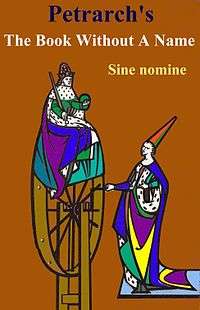Liber sine nomine
The Liber sine nomine (The Book without a Name) is a collection of nineteen personal letters written in Latin by the fourteenth century Italian poet and Renaissance humanist Petrarch. The letters being harshly critical of the Avignon papacy, they were withheld from the larger collection of his Epistolae familiares (Letters to Friends) and assembled in a separate book. In this fashion, Petrarch reasoned, a reader could throw away this collection, and the other letters to friends could be preserved for posterity.[1]

Correspondents
These letters were sent to his closest friends, who many times were well known figures to the public. So that he would not divulge their identities, he withheld these particular 19 letters and published this book "without a name" on any letter. Among these public figures were Philippe de Cabassoles, bishop of Cavaillon; Cola di Rienzo, a political leader; Francesco Nelli, secretary to the bishop Angelo Acciaioli I; Niccola di Capoccia, a cardinal; Lapo da Castiglionchio of Florence; Rinaldo Cavalchini, the son of the notary Oliviero; Stefano Colonna the Elder, the son of Giovanni Colonna who was one of the most important political figures in Rome; and Ildebrandino Conti, a bishop of Padua. In Letter 19, there was an appendix added addressed to the Holy Roman Emperor Charles IV as a final plea to move the papacy back to Rome.[2], Giovanni Boccaccio, another Italian author, in one of those letters there was the traduction of Decameron's last novel.
Excerpt
Petrarch here writes of the wheel of Lady Fortune,
Furthermore, it was a Roman who said "everything that is born must die; all things that grow, grow old." In time, therefore, all things grow old. Indeed, if the end of anything is its old age, then everything not already senile is certainly becoming so: for everything upright eventually falls and the fall is either preceded or at least accompanied by old age. There is no exception; whether they last long or not, all growing things sooner or later decline and waste away. Inconstant Fortune will turn her wheel ceaselessly, and will toss transient kingdoms from one people to another. In her wilfulness she will fashion kings out of slaves and slaves out of kings. She will wield her irresistible power over the city of Rome and the Roman world.[3]
Cultural references
Several other works have used the title Book without a name including those by
- Lady Morgan and Thomas Charles Morgan (1841)
- Theodore Annemann (1931)
- Kit Williams (1984)
Bibliography
- Norman P. Zacour's trans. Liber Sine Nomine titled: Petrarch's Book Without A Name, Pontifical Institute of Mediaeval Studies, Toronto, Canada (1973); ISBN 0-88844-260-2
- Kirkham, Victoria, Petrarch: a critical guide to the complete works, University of Chicago Press, 2009, ISBN 0-226-43741-8
- M.E. Cosenza, Francesco Petrarca and the Revolution of Coli di Rienzo, (Chicago University Press 1913)
- Paul Piur, Petrarca 'Buch ohne Namen' und die papstliche Kuri (Halle/Saale: Max Niemeyer, 1925).
- John E. Wrigley A Papal Secret known to Petrarch, Speculum, XXXIX (1964), pp. 613 – 634.
- E. H. Wilkins, Petrarch's Correspondence, (Padue: Editrice Antenore, 1960).
- E. H. Wilkins, Petrarch at Vaucluse, (University of Chicago Press 1958).
- J.H. Robinson, Petrarch, First Modern Scholar, (New York 1898).
- V. Rossi, Epistolae Familiares, volume 4, (Florence 1926)
References
- Kirkham, p. 461-2
- Zacour, p. 96
- Zacour, p. 51